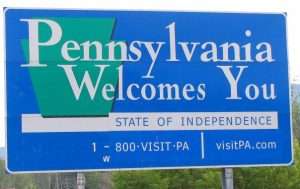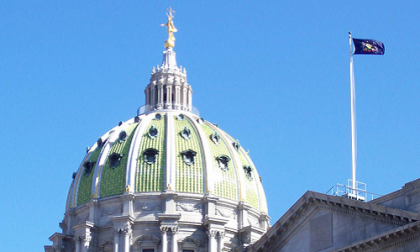Pennsylvania Rep. John Payne Not a Fan of Recent Gambling Study
April 29, 2016
By Dan Katz
As someone who has been in the poker industry for over a decade, who generally takes a “live and let live” mindset, and who shudders at the idea of lawmakers trying to legislate their own individual religious morality, I am all for the legalization and regulation of online poker. I am not “pro-gambling” per se – I’m not actually much of a gambler myself – but I believe that if people want to play poker on the internet, they should be allowed to do so. Thus, I tend to side with legislators who want to see online poker legalized in their states*, but that doesn’t mean I buy all of their arguments. Case in point: Pennsylvania State Representative John Payne.
Rep. Payne is a champion of online gambling in the Commonwealth, sponsoring HB 649, a bill to legalize and regulate online gambling. The bill passed through his House Gaming Oversight Committee by an 18-8 vote, but the vote by the full House has been postponed. Payne, as many legislators who are in favor of legalizing online gambling, feels that revenues derived from the games will help balance the state budget.
Lucy Dadayan, senior policy analyst at the Rockefeller Institute of Government, however, warns that gambling expansion will not necessarily work in the long run. In this month’s Blinken Report, a study on state revenues from gambling, Dadayan concludes that gambling expansion tends to only be a short-term fix.
In the 40-page report, she summarizes her findings:
In the short-run, states indeed do raise additional revenues due to expansion of gambling activities and facilities. However, history shows that in the long-run the growth in state revenues from gambling activities slows or even reverses and declines. In short, the revenue returns deteriorate—and often quickly. This pattern of deterioration may be due to competition with other states for a limited market (saturation), competition between different forms of gambling (substitution), or other factors. Despite the deterioration, the dynamic often continues, as states find new forms of gambling to authorize, open new facilities, and impose higher taxes on gambling. The results are short-run yields and longer-run deterioration.
For example, she states that between 2008 and 2015, tax and fee revenues (the money that flows to state coffers, inflation-adjusted) from commercial casinos increased by $1.3 billion in those states with “newly authorized casinos,” but in states with “established” casinos, those revenues dropped by $1.4 billion, a 1.5 percent net drop.
“We’re not for or against gaming, but the numbers speak for themselves,” Dadayan told The Morning Call. “They show that gambling revenues rise early, but decline as competition comes. As a budget revenue source, it’s not sustainable.”
The point is, expand gambling all you want – casinos, racinos, online poker, whatever – but don’t expect it to be some sort of grand solution to a state budget. Logically, it makes sense, even without the numbers. When a new business opens, consumer excitement and interest can drive sales for quite some time. But as the novelty dies down and competitors crop up (whether they are direct competitors or offer some other substitute for the product or service), sales will decline.
 Back to Rep. Payne; he doesn’t buy any of this fancy math mumbo-jumbo.
Back to Rep. Payne; he doesn’t buy any of this fancy math mumbo-jumbo.
“Not sustainable? I guess they’ve never heard of Las Vegas,” Payne told The Morning Call. “We know people are going to gamble, so we might as well regulate it and tax it. I hope they didn’t waste too much taxpayer money on that study. What we need to do is give casinos the tools to compete with other states.”
Wow. That statement alternates between condescension and logic in a way that, quite frankly, impresses me. He has a point in that people are going to gamble, anyway, so in order to prevent them from travelling to casinos out of state, it might be a good idea to expand in-state gambling and legalize online gaming. I know I, personally, would rather visit a decent casino in the Atlanta area or play from the comfort of my own living room than drive three or four hours up to some Harrah’s facility in North Carolina. If Georgia legalized casino or online gambling, I’d have no reason to head up north.
But the way Payne dismisses Dadayan’s research and analysis is just silly. The numbers I presented in this article are only a smidgeon of what is in the 40-page document. She clearly did a lot of work and her efforts deserve to be taken seriously. Would it behoove Payne to say something like, “I see the point Dadayan makes and will study it further, but I think online gambling will be successful for reasons X, Y, and Z.”
You can play the “agree to disagree” card without sounding like such a math-phobe.
Hell, at the end of The Morning Call article, he does a better job of presenting his argument. “Every casino has restaurants and some like Sands [Bethlehem] and Mount Airy [Monroe County] have built hotels,” Payne said. “If we grow this right, others will do the same and this will become an even bigger tourist attraction for Pennsylvania.”
Ok, there. Validity of the argument aside, he is now at least presenting some sort of case that gambling expansion can work beyond just the gaming revenues (though this point has nothing to do with online poker).
Bottom line is that I want the good people of Pennsylvania to be able to freely enjoy online gambling. It would be nice, though, if pro-gaming legislators wouldn’t dismiss valid, scientific evidence out of hand just because it doesn’t support their side.
*Can’t we just legalize online poker on the federal level and be done with it already?



















COMMENTS